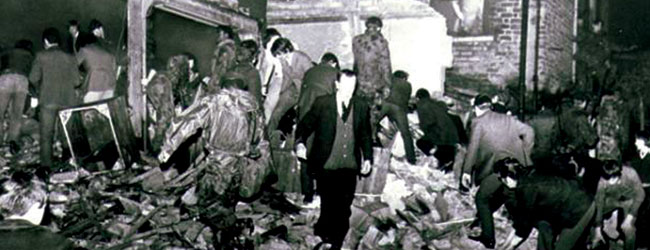30 July 2010
Police Ombudsman’s flawed McGurk’s Bar bombing report withdrawn after relatives’ anger
BY PEADAR WHELAN
POLICE OMBUDSMAN Al Hutch-inson has been forced to withdraw his report into the 1971 bombing of Catholic-owned McGurks’s Bar after an angry outcry by families of the victims, pointing to serious errors in the report.
His findings were “flawed and unforgivable”, according to some relatives of the dead.
They were outraged that Hutchinson’s findings, which took five years to complete, misnamed some of those who were killed and unbelievably dated the attack as having been carried out in 1972 instead of 1971.
Also, a number of relatives were incensed that Hutchinson’s conclusions cleared the RUC of over its failure to properly investigate the bomb attack.
The north Belfast bar was bombed in December 1971, resulting in the deaths of 15 people.
At the time, British Army Military Intelligence and the RUC, in a carefully-constructed misinformation operation, briefed the media that the deadly bombing was, as they termed it, an IRA “own goal” (i.e. a premature explosion caused during the preparation of a bomb).
Police Ombudsman Hutchin-son was scheduled to release his report into the bombing on Thursday, July 8th, but capitulated to pressure from the McGurk’s bombing families and withdrew his report.
On Saturday, December 4th 1971, Ulster Volunteer Force (UVF) bombers left a bomb estimated at 50lbs of explosives in the porch of the family-owned McGurk’s Bar at the junction of the North Queen Street and Great George’s Street in north Belfast.
The subsequent explosion left 15 patrons dead, including the wife and 12-year-old daughter of the owner, Patrick McGurk.
Within hours, British Military Intelligence and the RUC were briefing the media that the IRA had “scored an own goal”.
They planted the notion, in a media that was more than compliant, that an IRA bomb-maker had left the bomb in McGurk’s.
According to the British propagandists, the device exploded prematurely before collection by bombers for use elsewhere.
Despite an eyewitness account identifying the bombers and the fact that the bombing was claimed by loyalists in the immediate aftermath of the attack, the British authorities blamed the IRA.
Journalists were briefed by senior members of the British Army who claimed that forensic evidence confirmed republicans were responsible for the explosion.
And a duty report compiled by three RUC inspectors appeared to back up that theory, stating that “just before the explosion, a man entered the licensed premises and left down a suitcase, presumably to be picked up by a known member of the Provisional IRA. The bomb was intended for use on other premises.”
In her study, ‘Ireland: the Propaganda War’, Liz Curtis describes how the British Army and RUC, with the assistance of much of the press, successfully diverted attention from the evidence of loyalist involvement and used the atrocity to discredit their principal enemy, the IRA.
“The McGurk’s Bar bombing,” Liz Curtis wrote, “had caused more casualties than any single previous incident. Loyalists were responsible but never stood publicly condemned for it beyond nationalist areas.”
A retired British Army information officer interviewed by the Police Ombudsman said that within a day of the attack the military were aware of UVF involvement.
In addition the Police Om-budsman’s office had seen documents passed between the “military and government” (the then unionist Stormont government) which discussed the possibility that republicans had been preparing the bomb in the bar before planting it elsewhere and sought to promote it as an IRA ‘own goal’.
“There is no doubt that there was a desire to plant in the minds of the public the idea that the bombing was caused by the IRA. The documentation we have seen, which not only discusses this aim but considers how it may be achieved, was documentation between the [British] Army and the Government,” the Police Ombudsman said.
What has further angered the families of the dead is that members of the Stormont regime endorsed the British Army and RUC line.
The then Stormont Home Affairs Minister, John Taylor (now Lord Kilclooney) repeated the lie that the bomb was an IRA bomb.
The former minister said he was briefed by Home Office staff and admitted that there was no question that the bombing was a ‘Protestant paramilitary’ operation.
Robert McClenaghan, whose grandfather Philip Garry was killed in the attack, is scathing about the inadequacies in the Hutchinson report.
“It has been known for years that the UVF carried out the bombing of McGurks’s - loyalist killer Robert Campbell admiited in 1977 that he was responsible - so it is beyond me how Al Hutchinson can claim that the RUC investigated this atrocity in a thorough manner.”
Sinn Féin north Belfast Assembly member Gerry Kelly said:
“What needs to happen now is not for a rehash of what was given to the families this week but a new report which accurately deals with the facts in the case. These include the reality that the RUC wrongly and deliberately blamed the IRA for the bombing and that this was backed by the political establishment of the time.
“The way in which the office of the Police Ombudsman has conducted this report reflects badly on them. There is now a job to rebuild public confidence in their work. This needs to start with the production of a report into the McGurk’s Bar bombing which gets to the truth and delivers for the families.”
Follow us on Facebook
An Phoblacht on Twitter
Uncomfortable Conversations

An initiative for dialogue
for reconciliation
— — — — — — —
Contributions from key figures in the churches, academia and wider civic society as well as senior republican figures





